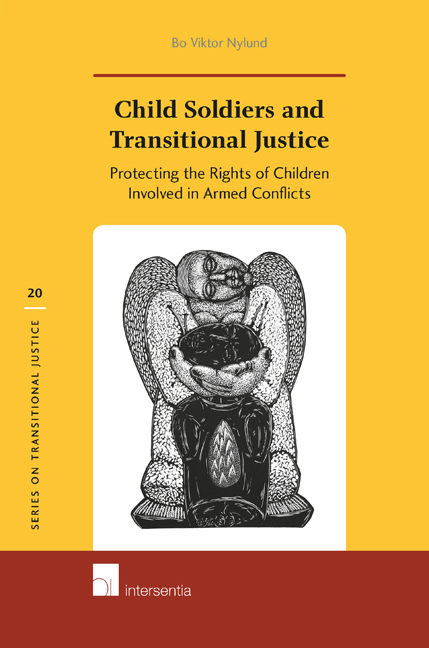 Child Soldiers and Transitional Justice
Child Soldiers and Transitional Justice Book contents
- Frontmatter
- Acknowledgements
- About the Author
- Contents
- List of Abbreviations
- Chapter 1 Objective, Scope, and Transitional Justice as an Analytical Framework
- Chapter 2 Child Recruitment and the Rule of Law: International Law and the Prohibition against Recruiting and Using Children to Take Direct Part in Hostilities
- Chapter 3 Child Recruitment and Criminal Justice: the Lubanga Case
- Chapter 4 Child Recruitment and Historical Justice: the Security Council Mechanism on Monitoring and Reporting
- Chapter 5 Child Recruitment and Reparatory Justice: Recovery and Reintegration of War-Affected Children
- Chapter 6 Child Recruitment and Institutional Justice
- Chapter 7 Children Involved in Armed Conflict and Participatory Justice: Balancing Rights and Responsibilities
- Chapter 8 Conclusions: Transitional Justice and the Potential for Stronger Protection of the Rights of Children Involved in Armed Conflicts
- Annexes
- Bibliography
Chapter 3 - Child Recruitment and Criminal Justice: the Lubanga Case
Published online by Cambridge University Press: 12 December 2017
- Frontmatter
- Acknowledgements
- About the Author
- Contents
- List of Abbreviations
- Chapter 1 Objective, Scope, and Transitional Justice as an Analytical Framework
- Chapter 2 Child Recruitment and the Rule of Law: International Law and the Prohibition against Recruiting and Using Children to Take Direct Part in Hostilities
- Chapter 3 Child Recruitment and Criminal Justice: the Lubanga Case
- Chapter 4 Child Recruitment and Historical Justice: the Security Council Mechanism on Monitoring and Reporting
- Chapter 5 Child Recruitment and Reparatory Justice: Recovery and Reintegration of War-Affected Children
- Chapter 6 Child Recruitment and Institutional Justice
- Chapter 7 Children Involved in Armed Conflict and Participatory Justice: Balancing Rights and Responsibilities
- Chapter 8 Conclusions: Transitional Justice and the Potential for Stronger Protection of the Rights of Children Involved in Armed Conflicts
- Annexes
- Bibliography
Summary
“I want to take my baby home. I want my parents to help me with him, but am not sure what will happen when I get home.”
INTRODUCTION
The criminal justice element of transitional justice is a call to punish leaders of previous regimes and individuals for their wrongdoing. Criminal justice is oft en what people immediately relate to when speaking of transitional justice. Prosecutions aim to ensure that those responsible for committing crimes are tried in accordance with international standards of fair trial and, where appropriate, punished for crimes carried out.
Key legal questions that are considered in chapter 3 include:
– Considering the current state of the art in turning the conscriptions (“forced”) and enlistment (“voluntary”) of children for use to participate actively in hostilities into an international crime, what are some of the implications of the recent Lubanga judgement?
– What is the role of criminal justice more broadly in bringing about change in the situation of children who are being conscripted and enlisted?
This chapter focuses on international criminal justice because it is the arena where the most detailed developments have taken place with respect to case law. International criminal justice from a post-conflict perspective has its roots in the Nuremberg trials, which brought about a substantial change in considerations of accountability, moving from collective to individual justice and from national to international processes. This was not to prioritize one method over another, but it was a new phenomenon at the time.
A critical aspect of criminal justice is the concept of the presumption of innocence and a crime having been committed “beyond reasonable doubt.” Criminal justice in any jurisdiction is not just about the rights of the victim, but also about the rights of the alleged perpetrator; hence, this chapter aims to carefully consider the different perspectives and prudently weigh the arguments. This is also why it is so important that criminal law is predictable and specific, and that those who are in place to implement that law are well prepared to do so.
- Type
- Chapter
- Information
- Child Soldiers and Transitional JusticeProtecting the Rights of Children Involved in Armed Conflicts, pp. 69 - 108Publisher: IntersentiaPrint publication year: 2016


